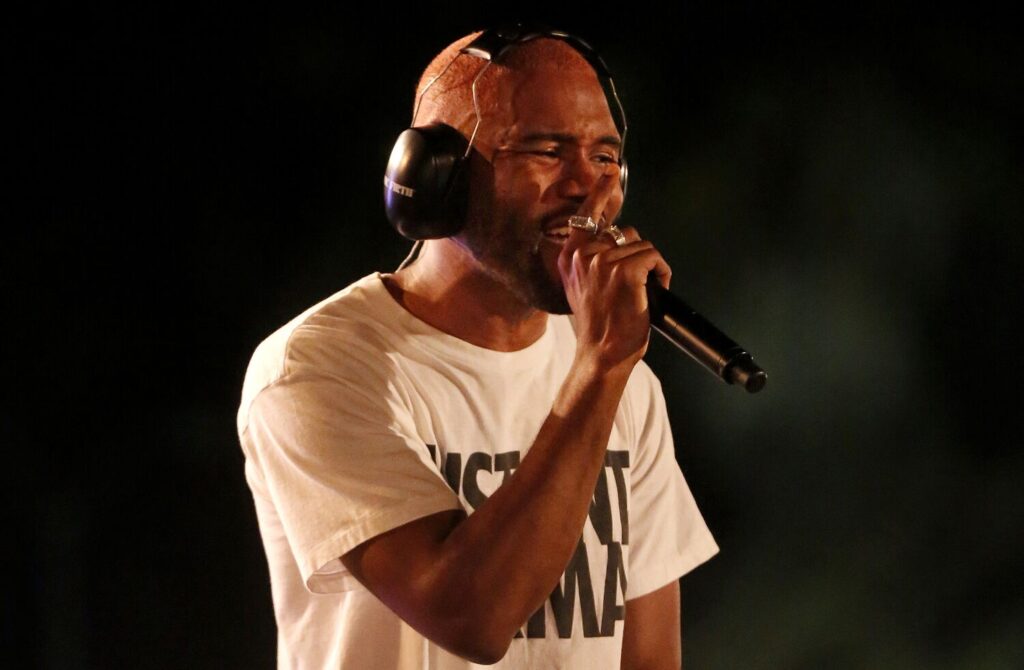Frank Ocean stood on the main stage at Coachella on Sunday night wearing an ice-blue parka, his hair under a black durag and fuzzy slides on his feet, and told the crowd of tens of thousands that he wanted to explain why he was there.
When was the last time you heard an artist justify their presence in front of you? The reason, as always, seemed axiomatic: Ocean was performing because that’s what performers do.
Except actually he hasn’t for years: Ocean’s headlining set here was his first concert since 2017, the year after he released his most recent album, “Blonde,” a personal and ambitious set of broadly defined soul music that helped set the path for much that came after it. Since then he’s thrown parties, worked on radio shows and tended to a luxury-goods brand in addition to releasing a string of singles. (He was set to headline Coachella in 2020 before it was canceled due to the pandemic.) But what drew him back to this stage, he said — after making clear with a laugh that he didn’t have a hotly anticipated new album ready quite yet — was the fact that “my brother and I, we came to this festival a lot,” including one year he fondly remembered when the two of them danced to the hip-hop duo Rae Sremmurd.
Ocean’s younger brother, Ryan Breaux, died in a car accident in Thousand Oaks in 2020 at age 18. “I know he would’ve been so excited to be here with all of us,” added Ocean, who grew up in New Orleans and moved to Los Angeles to pursue music after dropping out of college. The tenderness of his rationale was indicative of the deep thought he puts into his work.
Indeed, though it started almost an hour late — and was apparently cut short as a result of the festival’s curfew — this was perhaps the most elaborately conceived Coachella performance since Beyoncé’s game-changing set in 2018. Not that they shared anything structurally: Where Beyoncé went maximal in her ode to historically Black colleges and universities, Ocean took a starkly minimal approach that emphasized the idea of intimacy in his recollection of his brother. Yet the way the show rescaled the dimensions of a headlining festival gig felt like a radical provocation.
Ocean and a band of three musicians performed inside a small chamber tucked behind a massive high-def video screen that showed artfully composed close-ups of the players as they moved amid hulking piles of gear; much of the audience couldn’t even see inside the chamber, whose walls flickered with projections, which meant that many people experienced the concert as a kind of movie. (In an ironic twist, Ocean declined to make his set available to watch as part of Coachella’s popular YouTube livestream; he also prohibited photographers from shooting it.)
The set list pulled from “Blonde” and from Ocean’s 2012 major-label debut, “Channel Orange,” as well as from his recent-ish singles and from his 2016 visual album, “Endless,” whose footage of Ocean building a staircase came to mind as stagehands slowly erected his set-up. But he dramatically reworked familiar songs: “White Ferrari” had churchy organ over a squelchy techno beat, while “Self Control” became a folky acoustic ballad. Ocean’s singing was magnificent: pure one minute, abraded the next, each murmur and yowl vividly captured by Coachella’s incredibly powerful sound system.
Then again, for probably one-third of the 90-ish-minute gig, Ocean didn’t even sing: Partway through, a DJ he identified as Crystallmess started spinning records, including some of Ocean’s own, accompanied by footage of a man dressed like a security guard twerking against the stage. “You came to see Frank Ocean and you got a little rave mix in the middle of the show,” said the singer, who smiled widely into a camera, gold tooth glinting under the stage lights. Later, Ocean appeared about to do his song “Nights,” then evidently thought better of it, opting instead to dance around to the record; at another point, he introduced a kid named Josiah who sat down behind an electric piano and lip-synced to Ocean singing Willie Nelson’s “Night Life.” Throughout, the audience was rapt — nearly silent in either admiration or bafflement.
The result was willfully enigmatic even as it reaffirmed Ocean’s core talents as a vocalist and a teller of complicated stories. It ended with a gorgeous, spectral rendition of the Isley Brothers’ “At Your Best (You Are Love)” that had Ocean venturing up into his airiest falsetto. After the song, he conferred with someone and revealed that he’d been told he’d run out of time. “So that’s the end of the show,” he said.
Ocean is scheduled to repeat his performance next Sunday during Coachella’s second weekend. Who knows when we’ll encounter him again after that.

